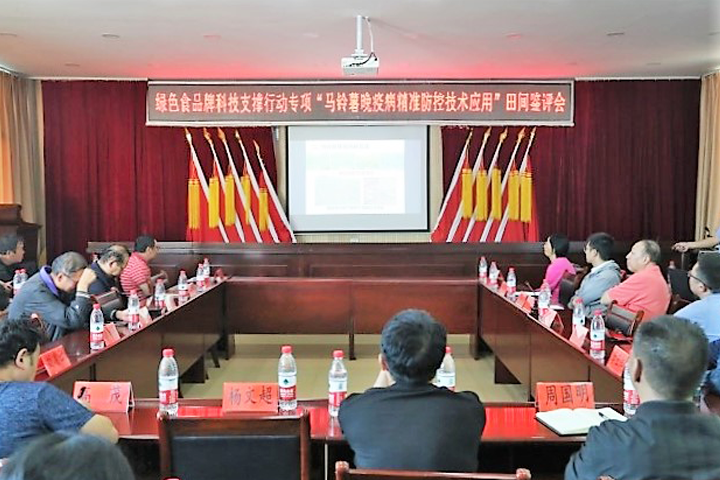Late blight disease costs potato farmers an estimated USD 3-10 billion per year globally. Farmers commonly use fungicides to control late blight, but because the cost of these agrochemicals can represent 10 to 25 percent the total value of a farmer’s potato harvest, their use significantly reduces family incomes and their application poses risks to humans and the environment.
Late blight is also a major constraint to potato yields in China, which inspired the formation of the AsiaBlight network seven years ago to develop an integrated approach to manage, and eventually eliminate, late blight disease with an aim to improve nutrition and food security for billions throughout Asia.
This fall, the International Potato Center at the CIP-China Center for Asia-Pacific (CCCAP) has been collaborating closely with the Yunnan Academy of Agricultural Sciences (YAAS) on trial evaluations of new varieties bred to resist late blight disease. Lu Xiaoping, the Director General of (CCCAP) made a field visit to YAAS to learn more about its work supporting China’s potato industry, particularly with regard to developing varieties and protocols to thwart late blight disease.
A second collaboration to the National Potato Improvement Center (NPIC) resulted in a key meeting this past September that explored NPIC’s field evaluations from a recent late blight fungicide trial and the recent acquisition of 300 potato germplasm samples from CIP. Afterward, during a visit to the Songming base of YAAS, the teams visited the greenhouse to inspect the work for potato hybrid breeding and pre-basic seed production. The visit concluded with a presentation on sweetpotato breeding and the current state of that industry in China.
For future collaboration, CIP-CCCAP and Potato Research Center of YAAS agreed to extend cooperation on six area:
- Introduction, preservation and distribution of potato and sweetpotato germplasm;
- Screening and evaluation of agronomic traits and disease-resistant traits of germplasm;
- Research on tetraploid and diploid breeding and new varieties of potato;
- Research and application of risk monitoring and precise disease control of Phytophthora infestans (the cause of late blight);
- Research and application of Internet of Things + seed tuber breeding; and
- Evaluation and utilization of preferred traits of sweetpotato germplasm for breeding improved varieties.
Participants in the visit included:
- Professor Dai Luyuan, Vice President of YAAS
- Dr. Yang Wanlin, Deputy Director of Industrial Crops Institute of YAAS
- Professor Sui Qijun, Chief Scientist of the Potato Research Center, YAAS
- Professor Li Xianping, Director of the Potato Research Center, YAAS
- Professor Zhao Zhijian, Deputy Director of the Potato Research Center, YAAS

